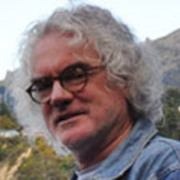
Chris Hampson
Chris Hampson has been working in film and television for more than 25 years.
Hampson's career has always involved words, and he has a healthy respect for the importance of the script in any screen production. Having started a law degree and finished one in arts, Hampson later spent time as an English teacher, book editor, co-starred at Circa in John Banas play Package Deal, and formed publishing company Hampson Hunt, with poet Sam Hunt. Their output included Hunt's Drunkard's Garden and Jan Kemp's Diamonds and Gravel.
Hampson went on to do stints as a writer and script editor in radio, then television. By 1980 he was Commissioning Editor of Drama at Radio New Zealand, then became a script editor in TVNZ's drama department. There he introduced Foreskin's Lament playwright Greg McGee to television, by commissioning him to write a play for anthology series Loose Enz, script edited the final television writing of playwright Bruce Mason, and worked on trucking drama Roche. Hampson left TVNZ in the mid 80s, around the time of a second Roche season which ultimately never panned out.
Soon after Hampson made his debut as a producer, working alongside Don Reynolds on low-budget movies Arriving Tuesday and Illustrious Energy. The latter project saw him rushing to Hong Kong a week before the start of filming, to find a replacement actor (Harry Ip) to play one of the main characters, who are both Chinese goldminers. Tuesday and Illustrious saw limited release despite enthusiastic reviews, although acclaimed Leon Narbey goldmining tale Illustrious Energy later won retrospective screenings in New Zealand and overseas.
In the same period, Hampson was one of those asked to offer his opinions on the script for Footrot Flats, New Zealand's first animated feature. Hampson ended up casting the appropriate voice talent (including the "achingly superb" John Clarke as Wal) to bring Murray Ball's tale to life. He can be seen talking about the film here.
Later Hampson spent time as head of development at South Pacific Pictures, during its early days as a wholy owned subsidiary of TVNZ. He was executive producer during the first three years of Shortland Street, and for two seasons of resort drama Marlin Bay. He travelled to France to help stitch up the deal for the first official Franco-Kiwi-Australian co-production, big-budget kid's series Deepwater Haven, and co-created and wrote for another co-production, period tale Gold. Hampson also worked alongside future business partners Chris Bailey and Greg McGee on David Lange mini-series Fallout.
In 1994 Hampson joined Wellington's Gibson Group for a two year stint. There he produced 26 episodes of current affairs drama Cover Story; Hampson is proud of the show's handheld, boundary-pushing shooting style. He also produced Dean Parker tele-movie Share the Dream (starring Joel Tobeck), and Communicado mini-series The Chosen, a tale involving religious cults.
Hampson and multi-national producer Chris Brown played a key part in developing low budget feature scheme, ScreenVisioNZ. Launched in 1996, the scheme aimed to encourage new talent, through joint funding from the NZ Film Commission, New Zealand On Air and TVNZ. Working with Brown, Hampson played executive producer on three of the six films, Anthony McCarten's Via Satellite, Mark Beesley's Savage Honeymoon, and the scheme's breakout hit, Robert Sarkies' student thriller Scarfies.
In 1998 Hampson joined forces with veteran producer-director Chris Bailey, and writer Greg McGee to form the company ScreenWorks. "We wanted to make our own mistakes," said Hampson," rather than other people's." The trio launched with law/police drama Street Legal. Again shooting handheld on location round Auckland, this tale of maverick lawyer (Jay Laga'aia) ran for four successful seasons.
Hampson would produce a run of ScreenWorks productions. He is especially proud of what was achieved with mini-series Doves of War — shot partly in the Hague and the United Kingdom — and Skin and Bone, a tele-movie re-imagining of McGee's classic play Foreskin's Lament. Meanwhile ScreenWorks border security drama Orange Roughies proved an impressive seller overseas, despite enduring some bumpy scheduling at home.
Hampson's most recent TV productions include tele-movie docu-drama Stolen: The Baby Kahu Story, comedy Diplomatic Immunity, and award-winning fantasy series Kaitangata Twitch. He also produced 2002 Rebecca Hobbs short film Tick, which won an opening slot at the New York Film Festival, and was part of the team that helped George Rose complete his ambitious short Time is a Spider.
Sources include
Chris Hampson
The ScreenWorks Team - Chris Hampson (Profile). ScreenWorks website. Accessed 2 February 2014
'Chris Hampson - the negotiator' (Video Interview), NZ On Screen Website. Director James Coleman (Uploaded 12 April 2011). Accessed 12 April 2011
Mark Cubey, 'Truckin On' - Onfilm, April 1985, Page 31 (Volume 2, No 3)
John Reid and Ruth Jeffrey, Circa 1976 - 1996 (Wellington: Council of Circa Theatre, 1996)